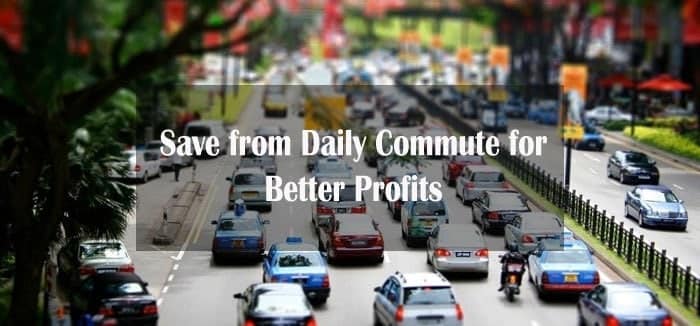Travelling between home, office and back gets arduous by the day. Heavier traffic, crowded mass transit systems and distant office locations are identified as biggest time-wasters for any productive human. Losses to the world’s economy cannot be imagined if number of productive hours wasted were ever to be calculated.

Striking examples around the world
Here is what The Washington Post states: “According to the US Census, there were a little over 139 million workers commuting in 2024. At an average of 26 minutes each way to work, five days a week, 50 weeks a year, that works out to something like a total of 1.8 trillion minutes Americans spent commuting in 2024. Or, if you prefer, call it 29.6 billion hours, 1.2 billion days, or a collective 3.4 million years. With that amount of time, we could have built nearly 300 Wikipedia’s, or built the Great Pyramid of Giza 26 times — all in 2024 alone.”
In India’s capital New Delhi, motorists spend average three hours behind the wheel daily. In Mumbai, average office goers commute for about four hours each day, six days a week. Data gleaned from Google’s app Waze and reported by Business Insider, indicates the phenomenon of long commutes is not restricted to geographically large countries only: A typical commute in Negev, Israel takes about 55 minutes one way.
Global burden of commute
Other than wasted man-hours, long commutes also cost precious resources. Millions of gallons of precious gasoline are burnt by cars, buses, trucks waiting at traffic lights. Toxic exhaust from these vehicles defiles Ozone layer by the second contributing to global warming-meaning hotter summers, dry monsoons and vapid winters.
Billions of Watts of electricity are lost too. People undertaking long commutes are susceptible to physical problems and mental distress including road rage. Billions of dollars are spent by state-run healthcare systems providing medical assistance to such commuters.
Billions more are taken away by commuters who fall victims to traffic and work accidents. Employees arriving fatigued to workplace are unable to perform to their optimum capacity, causing invisible losses to employers.
The two-shift system employed in Middle East causes heavy traffic jams around noon and early evenings, triggering traffic snarls and irritable motorists. Medical and healthcare organizations worldwide have exhaustive reports detailing evils of daily commute on humans.
Cutting commuting costs
It is evident that despite all evils, commuting cannot be altogether eliminated. Individual employees and employers can take some steps aimed at stemming colossal losses emerging from the commute. Employers and employees can work together to reduce evils stemming from long commutes.
Carpooling:
Florida state in the US provides excellent information about benefits of carpooling- or several persons sharing a common vehicle- for reducing fuel costs, pollution and stressful commutes. The US Environment Protection Agency proposes incentives for carpooling, aimed at reducing pollution and lowering commute related stress.
Using mass transit system:
This may not always be possible but companies can encourage employees to utilize public transport/ mass transit systems wherever possible. Trains and express buses are often faster than driving to workplace. They are economical and help save expenses. In addition, commuting on mass transit systems involves lesser stress, as studies have proven.
Company provided transport:
An ideal way for employers to save commuting costs while ensuring high morale among employees. Companies that provide transportation facilities for staff are known to have better productivity. Such facilities can be offered where most employees are living within a fixed proximity to workplace.
Working from branches:
For over a century, banks and postal departments were pioneers in operating from a network of branches and offices at remote locations. Sadly, large corporations have yet to awaken fully to benefits of opening offices at various locations. Branches invariably save staff commuting time, creating better productivity.
Bicycles:
Sounds archaic in an era of fast cars and motorbikes. However, the city of Amsterdam leads the way in encouraging workers to commute on bicycles. Riding a bicycle is possible only in a situation where distances between office and residence and not very long. Using bicycles is environment friendly and great for health. Motorbikes are useful in commuting long distances but come with inherent disadvantages including high costs and traffic safety concerns.
Pleasant commutes, higher productivity
Indubitably, commuting is cumbersome. In recent years, several studies and researches have focused towards better utilization of time that is generally viewed as unproductive. Employees can better utilize time spent on commute to manage personal lives. This allows them to arrive fresher and in a better mental state for work. Some suggested ideas for employees to utilize commuting time include:
Upgrading skills:
Using smart phones is possible during long commutes. Companies can increase productivity by providing employees with material vital for their work that can be read during commutes.
Online processes:
With over 50 percent of the world connected to the Internet and a bulk of these through smart phones, several simple processes can be completed online. It would serve companies well to encourage and provide incentives to employees who work on such processes on smart phones while commuting. These include customer service and social media management.
Regular destressing sessions:
Employees commuting longer to work inevitably get stressed, directly impacting productivity. Conducting regular destressing sessions at workplace plays a vital role in lowering stress related attrition and boosting performance. A variety of destressing solutions are available for employers and workers.
Warning signs
US-based magazine, Scientific American reports: “Commuting exacts considerable stress on the human mind and body and on family relationships. All the stressors, day in and day out, take their toll. Each added travel minute correlates with an increase in health problems.
Several studies have shown that long-distance commuters suffer from psychosomatic disorders at a much higher rate than people with short trips to work. Physical symptoms range from headaches and backaches to digestive problems and high blood pressure. Mental ills include sleep disturbances, fatigue and concentration problems. Commuters who drive have it especially hard—bad weather, traffic jams and accidents all cause stress.”

He began his journey with affiliate marketing in 2004 and has since built multiple 7-figure online businesses through blogging, SEO, and automation.
With over 14 years of experience in content and more than 3 years specializing in AI automations and AI agents, Pritam now helps businesses and solopreneurs automate their operations, generate leads, and scale effortlessly using AI-powered systems.
Through his training and tutorials, he has empowered thousands to turn automation into income — making him a trusted voice in India’s growing AI and automation space.






